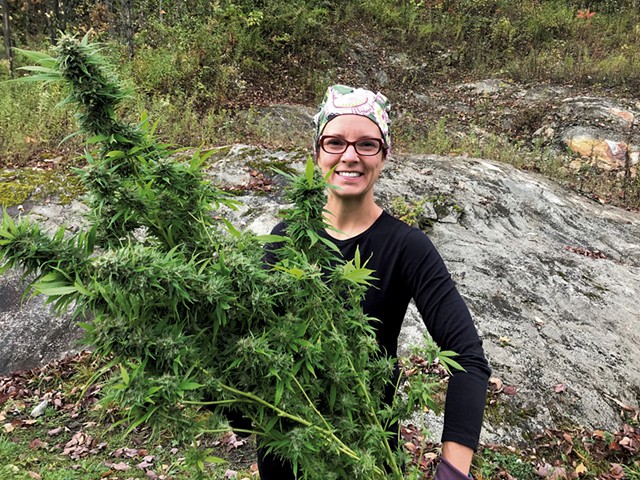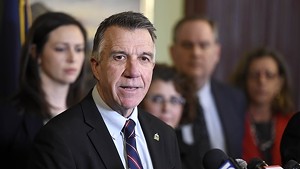
- Courtesy Of Jessilyn Dolan
- Jessilyn Dolan
These are heady times for cannabis legalization advocates, many of whom have fought for decades to end prohibition. Vermont now stands on the threshold of implementing a taxed and regulated adult-use market, which will allow anyone 21 or older to purchase marijuana and other THC-containing products at state-licensed dispensaries.
Regulation and oversight of Vermont's nascent cannabis industry will soon fall under the auspices of the newly created Cannabis Control Board. The independent, three-member body, recently appointed by Gov. Phil Scott, awaits Senate confirmation before it can get to work.
Policy watchers liken the Cannabis Control Board to Vermont's Public Utility Commission. But instead of overseeing industrial solar fields, natural gas pipelines and cable TV franchises, the board will regulate ganja greenhouses, edible testing laboratories, and recreational and medical marijuana dispensaries.
Even before the board wades into the weeds of Vermont's budding pot sector, some medical cannabis patients and their caregivers fear that their voices won't be heard amid the stampede to open the recreational market.
Last October, when the legislature enacted Act 164 without the governor's signature, lawmakers recognized that a three-person board couldn't possibly possess all the knowledge and experience needed to promulgate rules and regulations for such a vast emergent industry.
For this reason, Act 164 created a 12-member advisory committee, whose participants are chosen by state officials, agencies and legislative committees for their areas of expertise. Vermont's attorney general will appoint two public safety and criminal justice reform experts; the state treasurer will choose a business management and regulatory compliance expert; the speaker of the House of Representatives will select an expert on women- and minority-owned businesses; and so on.
But there's a glaring omission amid that pantheon of presumably cannabis-competent professionals — a medical professional with knowledge and experience in therapeutic cannabis use. With oversight of the medical marijuana program moving from the Department of Public Safety to the Cannabis Control Board, some patients who use cannabis to relieve chronic pain, nausea, seizures, PTSD and other debilitating conditions worry that their priorities will get lost in the haze.
"Our voice hasn't been heard," said Jessilyn Dolan, a registered nurse, medical marijuana registry patient and cannabis caretaker — a grower who supplies other registry patients. "All this effort is going to tax and regulate, but patients are being left out to dry."
Dolan, 42, of Underhill is founder and president of the Vermont Cannabis Nurses Association and serves on the board of directors of the American Cannabis Nurses Association. She explained that the Marijuana for Symptom Relief Oversight Committee, which for years has served as an advisory group to the legislature and the governor, has included a registered nurse, a physician and patients representing each of the state's five dispensaries. Yet that committee is slated to disband in 2022, with no plans to extend its term or roll it into the new regulatory structure.
Evidently, state lawmakers wanted some health care expertise on the advisory committee. Specifically, Act 164 requires that the governor appoint two people: one with expertise in "public health" and one with professional chops in "laboratory science or toxicology."
But, as Dolan pointed out, neither of those appointments requires knowledge of or experience in cannabis as medicine. And the only other public health professional mandated on the advisory committee is an expert in substance misuse prevention.
As of late last week, the governor's team had yet to choose its advisory committee appointees, or even compile a list of names to recommend for Scott's approval.
"Ostensibly, the person we would appoint to that position would have an interest in public health and how cannabis relates to it," said Scott's press secretary, Jason Maulucci.
Several weeks ago, a fix seemed possible through S.25, a largely technical bill intended to correct some of the original language and timeline in Act 164. But, according to Dolan, a recent amendment "threw a monkey wrench into the works" when it added a 13th seat to the advisory committee. The Vermont Cannabis Trades Association, an industry group representing three of the state's five medical dispensaries, will chose that committee member.
While the 13th seat could go to someone with a medical background, the bill doesn't mandate it. As Dolan noted, that appointment could just as easily go to a lobbyist or a lawyer. She and other cannabis caregivers fear that, ultimately, they won't have a voice on the Cannabis Control Board or the advisory committee, which she called "kind of scary."
Why? Because guaranteeing the safety and purity of cannabis products is arguably even more critical for medical patients, many of whom have compromised immune systems and are highly sensitive to impurities such a molds, pesticides and other contaminants. And unlike states such as California and Oregon, where medical cannabis programs require independent, third-party laboratory testing of all medicinal cannabis, Dolan said, Vermont has no such requirement.
"The lab testing for the Vermont Hemp Program is 10 times more stringent than [that of] our medical marijuana program," added Dolan, who is also cofounder of NurseGrown Organics, a hemp and CBD producer. "No one talks about this."
Not all legalization advocates are as critical of Vermont's medical program. The Marijuana Policy Project noted in a recent policy update that Vermont has continued to improve its medical program since 2004, when then-governor Jim Douglas signed the legislation into law.
The state legalized medical dispensaries in 2011, and it has steadily expanded its list of qualifying conditions. In 2016 it added chronic pain and, in 2017, Parkinson's disease, Crohn's disease and PTSD. Dolan, who is also a research nurse studying opioid use and cannabis at the Robert Larner College of Medicine at the University of Vermont, hopes the state will one day include opioid-use disorder on that list, as well.
But such a change may require that Vermont's cannabis patients have a seat at the table when those discussions take place.












Comments
Comments are closed.
From 2014-2020, Seven Days allowed readers to comment on all stories posted on our website. While we've appreciated the suggestions and insights, right now Seven Days is prioritizing our core mission — producing high-quality, responsible local journalism — over moderating online debates between readers.
To criticize, correct or praise our reporting, please send us a letter to the editor or send us a tip. We’ll check it out and report the results.
Online comments may return when we have better tech tools for managing them. Thanks for reading.